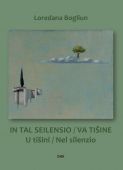Why ‘Pula Essay Days’?
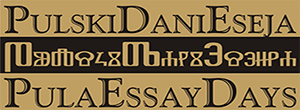
Through the Pula Essay Days, we attempt to establish an international just literary meeting in Pula and to make it traditional, i.e. the one understood from a special literary viewpoint as a town-essay – looked-over with all its advantages as well as disadvantages, and respectable as much as we, creators and intellectuals living here at the moment, together with our guests, invest into the winning of its reputation… Provided we succeed in these essay days, Pula might find its place in the cultural-and-literary map of our towns hosting important literary events. In Croatia, essay literature is given prizes but there is no meeting where creative authors gather in order to say what they have to say about essay or to do it like true essayists. As this given chance – known as the Pula Essay Days – is currently depending on the engagement and willingness of some people, we will see how much official as well as unofficial Pula & Croatia, particularly the cultural one, understands this cultural stimulus and cultural sign, how much it will be able to accept and support this initiative in the future.
Our programme is partly related to the previously held cultural meetings – on the end of the century/millennium jointly organised by the Istrian branch of the Croatian Writers’ Association and the journal Nova Istra (1998 and 1999 in Poreč and Rovinj entitled ‘Reading Signs of Time’, the proceedings under the same title published in 2001).
We would like to keep having this meeting organised in two sessions; i.e. one session on the essayistic approach to essay as a literary form, genre … (essay on essay) and another one on the essayistic approach to a particular topic. In terms of selection and approach to any given or selected issue, the widest framework refers to humanities, literature and art in particular. Since the very beginning, we have also been promoting the aesthetic, poetic, generation-gap and other openness and diversity considering participants we invite.
As an old form, even an independent genre these days, literary (also literary-and-philosophical, philosophical-and-literary, etc.) essay 'settles a dispute' between literature and science, reflection and limitless imagination; free in selection of contents, neither piece of criticism nor feuilleton, neither learned essay nor article, as it is more complex than the stated; it is 'high-class' and 'the most flexible' form, very frequent and almost prevailing in contemporary literature (essay-novel, novel-essay …); sometimes so much alike palimpsest, with its specially structured texture, essay is seen as certain literary cursive when the Croatian 20th century poetic giant Tin Ujević is taken into account – let us repeat it once again.
Boris Biletić



Izvješće prosudbenog povjerenstva o nagradi...
Prosudbeno povjerenstvo u sastavu: dr. sc. Dunja Detoni Dujmić, književnica; akademik Goran...
saznajte višeNAGRADA „ZVANE ČRNJA“ 2019.
(Iz Obrazloženja) Na ovogodišnji natječaj za Nagradu „Zvane Črnja“ prijavljeno je šesnaest...
saznajte višeRezultati natječaja za nagradu „Zvane Črnja“...
DRUŠTVO HRVATSKIH KNJIŽEVNIKA ZAGREB i ISTARSKI OGRANAK DHK PULA - NAGRADA „ZVANE ČRNJA“...
saznajte višeNAGRADA „ZVANE ČRNJA“ 2021.
Nagrada Zvane Črnja 2021. – obrazloženje Na Natječaj za Književnu nagradu Zvane Črnja za...
saznajte višeRezultati natječaja za nagradu „Zvane Črnja“...
DRUŠTVO HRVATSKIH KNJIŽEVNIKA ZAGREB i ISTARSKI OGRANAK DHK PULA - NAGRADA „ZVANE ČRNJA“...
saznajte više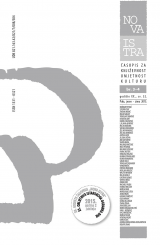
Nova Istra broj 3-4/2015.
- U sjećanje
- Suvremena književnost
- Tema: HRVATSKA KNJIŽEVNOST U SUSJEDSTVU
- Nagrada „Zvane Črnja“ za 2014.
- Novi prijevodi
- Studije, ogledi, zapisci
- U spomen: GORAN STARČEVIĆ
- Hrvati i Ukrajinci
- Prilozi o zavičaju
- Kritički pristupi i osvrti
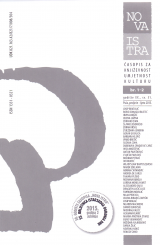
Nova Istra broj 1-2/2015.
- U sjećanje
- Suvremena književnost
- Tema: ANTUN GUSTAV MATOŠ (1873.-1914.)
- Novi prijevodi
- Studije, ogledi, zapisci
- Prilozi o zavičaju
- Kritički pristupi i osvrti
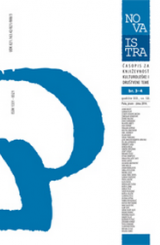
Nova Istra broj 3-4/2014.
- Suvremena književnost
- Novi prijevodi
- Tema: Optimizam
- Nagrada "Zvane Črnja" za 2013.
- Ogledi i zapisci
- Tema: Politika i političari
- Prilozi o zavičaju
- Kritički pristupi i osvrti
“Pjesme siromašna proroka”
- Autor: Jehuda Amihaj
- Opseg: 82 stranice
- Uvez: tvrdi
- Cijena: 95 kn
“Vuk u supermarketu”
- Autor: Goran Starčević
- Opseg: 204 stranice
- Uvez: tvrdi
- Cijena: 140 kn / 19 €
“Pod starim voltama: Istarskim gradićima u...
- Autor: Daniel Načinović - Eduard Strenja
- Opseg: 271 stranica
- Uvez: tvrdi, šivano
- Cijena: 160 kn / 22 €
“Mravi iz nezakcija”
- Autor: Jakša Fiamengo
- Opseg: 110 stranica
- Uvez: tvrdi, šivano
- Cijena: 110 kn / 15 €
GIACOMO SCOTTI: “IZMEĐU DVAJU SVJETOVA”
- Autor: Giacomo Scotti
- Opseg: 335 str., bio-bibliografija i sažetci
- Uvez: tvrdi, šivano, razdjelna vrpca
- Cijena: 25.88 €
“Štorije od žalosti”
- Autor: Drago Orlić
- Opseg: 110 stranica
- Uvez: tvrdi, šivano
- Cijena: 100 kn / 14 €
“Čakavsko pjesništvo XX. stoljeća”
- Autor: Milorad Stojević
- Opseg: 404 stranice
- Uvez: tvrdi, šivano
- Cijena: 220 kn / 30 €
IRVIN LUKEŽIĆ: “KVARNERSKO-ISTARSKI OGLEDI I...
- Autor: Irvin Lukežić
- Opseg: 371 str., bio-bibliografija i sažetci
- Uvez: tvrdi, šivano, razdjelna vrpca
- Cijena: 185 kn / 25 €
“Drugi Šoljanov zbornik”
- Autor: Skupina autora
- Opseg: 202 stranice
- Uvez: meki, broširano
- Cijena: 100 kn / 13 €














